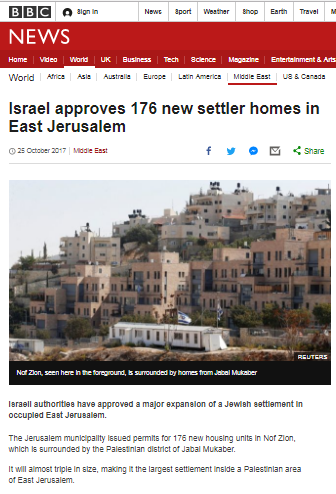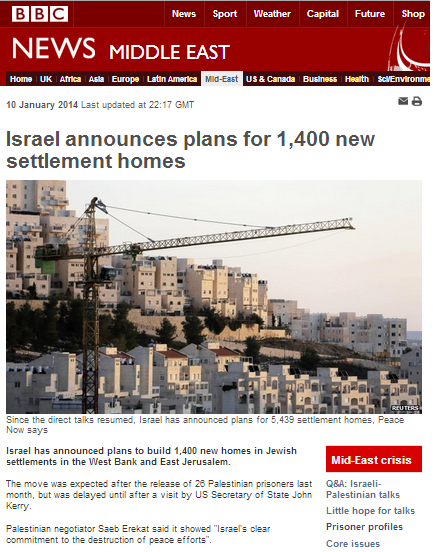Earlier this month the BBC’s most quoted Israeli newspaper, Ha’aretz, published an article by Barak Ravid and Chaim Levinson titled “Netanyahu Pledged 3,800 New Settlement Homes, but Only 600 Will Be Actually Built” and sub-headed “[c]lose examination of the list of construction plans expected to be approved next week reveals that the number of units presented to the public inflated and recycled”.
“The 3,800 units presented to the public is an inflated, recycled number, with the government expected to give immediate building permits to only 600 units.
Of these, 300 homes will be in Beit El, promised to the settlement after the demolition of the homes in Ulpana Hill over five years ago.[…]
Final approval will also be given for 102 homes in the new settlement of Amichai, which is being built for those evacuated from the illegal outpost of Amona. But since there has been no decision made yet on the objections that were submitted to the plan, construction isn’t expected to begin in the near future. […]
The total of 3,800 units includes plans that were approved in the past but which have had some units added. For example, Kfar Etzion already had 120 units approved, and the 38 have now been added. The government is thus presenting all 158 as “new” homes to be approved. A similar trick was pulled in Har Adar, where 10 additional homes were added to a previously approved plan of 60 homes and together became a “new” plan for 70 homes.
That’s not the only strange matter on the list published Tuesday. In Elkana, there had been a previously approved plan for 45 homes. Now the planning council is meant to turn that plan into a sheltered housing facility for 250 elderly people. The government is counting it as 250 new homes.”
On October 25th (two weeks after the appearance of that Ha’aretz article) readers of a report published on the BBC News website’s Middle East page under the headline “Israel approves 176 new settler homes in East Jerusalem” were told that:
“Last week, Israeli authorities approved the construction of more than 2,600 additional homes in settlements across the West Bank.”
The BBC already reported on the planning approval for 234 units in Elkana over a year ago. In January of this year it reported on the approval for 100 units in Beit El and in June it reported on the plans for Amichai.
In other words we see that the BBC policy of reporting the same planning applications over and over again – and thereby inflating the number of what it likes to call “settler homes” constructed in the minds of its readers – continues to be an issue.
As is inevitably the case, this latest BBC report (which once again promotes a partisan map produced by a political NGO) fails to meet the corporation’s own editorial guidelines on due impartiality by failing to give “due weight” to alternative views of its standard mantra:
“About 200,000 Jewish settlers and 370,000 Palestinians currently live in East Jerusalem. The settlements are considered illegal under international law, though Israel disputes this.”
As usual too, this report portrays history as having begun in June 1967 with no mention of the Jordanian occupation of Judea & Samaria and parts of Jerusalem or explanation of the territory assigned by the League of Nations to the creation of a Jewish National Home in 1922.
“Israel has occupied East Jerusalem and the West Bank since the 1967 Middle East war. It annexed East Jerusalem in 1980 in a step that was not recognised by the international community.”
The article portrays the story which is its subject matter as follows:
“Israeli authorities have approved a major expansion of a Jewish settlement in occupied East Jerusalem.
The Jerusalem municipality issued permits for 176 new housing units in Nof Zion, which is surrounded by the Palestinian district of Jabal Mukaber.
It will almost triple in size, making it the largest settlement inside a Palestinian area of East Jerusalem.”
BBC audiences were not, however, told that preliminary plans for those “new housing units” were already approved in 1994 and that the first 91 units were built in the early 2000s. Neither were they informed of some relevant background to the story: (translation by BBC Watch)
“The basis of the neighbourhood [Nof Zion] is on lands that were purchased on the hill by 11 Jewish families in the 1930s. After the War of Independence the Jewish contractor Rahamim Levi bought lands on the slope overlooking Temple Mount from residents of the Arab village. His children, Yehuda Levi and Evi Levi, completed the job in the coming years when they bought the plots from the Jewish families. But the area did not have building permits and in the coming decades, until the beginning of the 1990s, the land stood empty. Only during the time of the Rabin government were building plans approved for the site.”
When, in April 2015, planning permission was granted for over 2,000 units in Jabel Mukaber the BBC did not bother to report that story because the permits were for the Arab sector. In other words, once again we see that the BBC’s interest in reporting on Israeli planning permits is not determined by the project’s location or by the ownership of the relevant land but is entirely dependent upon the faith and ethnicity of the people it assumes will be moving into newly built apartments and houses in specific areas.
That is self-conscription to a political cause rather than journalism.
Related Articles:
BBC News promotes more of its unvarying narrative on Israeli construction
‘Due impartiality’ and BBC reporting on Israeli construction
The BBC’s inaccurate and misleading representation of Israeli building – part two
BBC presents property purchased by Jews as ‘settlements’
Why is this Israeli planning decision different from others for the BBC?
What does the BBC refuse to tell its audiences about ‘settlements’ in Jerusalem?




